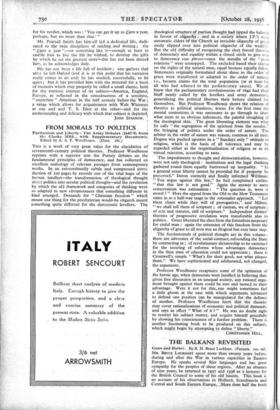Puritanism and Liberty : The Army Debates (1647-9) from the
Clarke MSS., with Supplementary Documents. Edited by A. S. P. Woodhouse. (Dent. 18s.)
FROM MORALS TO POLITICS
THIS is a work of very great value for the elucidation of seventeenth-century political theories. Professor Woodhouse reprints with a superior text the Putney debates on the fundamental principles of democracy, and has collected an excellent anthology of relevant passages from contemporary works. In an extraordinarily subtle and compressed intro-, duction of too pages he records one of the vital leaps of the human intellect—the transformation of theological thought about politics into secular political thought—and the revolution by which the old framework and categories of thinking were so adapted to new circumstances that something different in kind emerged. Demands for " Christian freedom " which meant one thing for the presbyterian would-be oligarch meant something quite different for the democratic levellers. The
theological structure-of puritan thought had tipped the balance in favour of oligarchy : and in a society where J.P.'s were automatic elders of the Church an invisible oligarchy of grd_e easily slipped over into political oligarchy of the wealthy. But the old difficulty of recognising the elect forced theories of democracy and equality within a closed circle to give way to democracy sans phrase—once the mouths of the " poor relations " were unstopped. The excluded based their claims on the rights of the natural man, equal because equally fallen. Statements originally formulated about those in the order of grace were transferred or adapted to the order of nature, i.e., became claims for the total population (or at least for all who had adhered to the parliamentary cause). We all knew that the parliamentary revolutionaries of 1642 had their bluff neatly called by the levellers and army democrats, generalising the political liberties their betters claimed for themselves. But Professor Woodhouse shotvs the relation of theories to political situations, traces for the first time the mental contortions it was necessary to go through to draw what seem to us obvious inferences, the painful sloughing of the theological skin: The great liberating element was what he calls " the segregation of the spiritual from the secular," the bringing of politics under the order of nature. The arbiter in, the order of nature was reason, common to all men. Dogma was pushed upstairs in a " Sundays only " attitude to religion, which is the basis of all tolerance and may be regarded either as the respiritualisation of religion or as its virtual rejection, according to taste.
The impedimenta to thought and democratisation, however, were not only theological : institutions and the legal thinking gathered round them equally buttressed up inequality. " In a general sense liberty cannot be, provided for if property be preserved," Ireton correctly and finally informed Wildman. " You argue against this law," he had complained earlier, " that this law is not good." Again the answer to mere conservatism was rationalism : " The question is, were it moral ? " Here the appeal from the Old to the New Testament came in as a half-way stage to the rationalist approach. " Let them chant while they will of prerogatives,". said Milton, " we shall tell them of scripture ; of custom, we of scripture ; of acts and statutes, still of scripture." Independent divines' theories of progressive revelation were transferable also to politics. Grace liberated the elect from the formalism necessary for sinful man : again the extension of this freedom from the Oligarchy of grace to all men was an illogical but easy later step.
The fundamentals of politiCal thought are in this volume : there are advocates of the social contract, refounding the State by contracting in ; of revolutionary dictatorship to be exercised for the securing of reforms whose advantages democracy in the then state of education could not appreciate ; there is Cromwell's simple " What's for their good, not what pleases them." We have sophisticated and adulterated, not changed, the arguments.
Professor Woodhouse recaptures some of the optimism of the heroic age, when democrats were justified in believing that, given free discussion in an unequal society, any rational argu- ment brought against them could be met and turned to their advantage. Were it not for this, one might sometimes fee] a little gloom at the ease with which arguments advanced to defend one position can be manipulated for the defence of another. Professor Woodhouse hints that the theories may cover rationalisations of economic and political demands. and says in effect " What of it ? " He was no doubt right to restrict his subject matter, and acquits himself gracefully by showing his consciousness of a further problem. There is another fascinating book to be • produced on this subject, which might begin by attempting to define " liberty."
CHRISTOPHER HILL.
























































 Previous page
Previous page